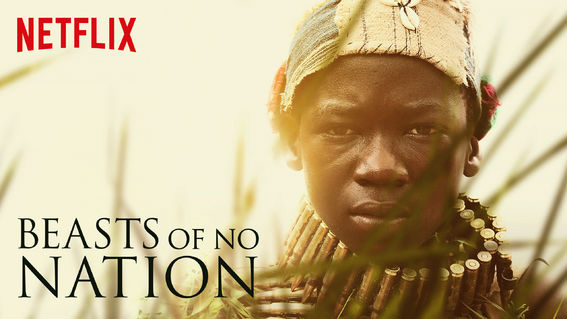Netflix’s First Original Movie “Beasts of No Nation” Proves a Success

It’s getting harder and harder to remember a time when Netflix wasn’t around. I can hardly believe there once was a time when binge watching old TV shows wasn’t possible. Recently, Netflix decided to build upon the success of its original TV shows, such as “House of Cards,” and expanded its content to include original movies, the first of which is “Beasts of No Nation.” The film is based on Uzodinma Iweala’s novel of the same title, and it debuted on Netflix on Oct. 16, the same day it was released in U.S. theaters.
“Beasts of No Nation” follows the life of a young boy named Agu, played by Abraham Attah, living in an unnamed West African country torn apart by civil war. After the murder of his father and brother by government soldiers, Agu flees into the jungle where he encounters a group of rebel forces led by a fearsome commandant. The commandant, played by Idris Elba, takes Agu under his wing and welcomes the boy into his battalion. Under the watch of this new mentor, Agu transforms from an innocent child into a hardened killer.
Though the movie takes place during a grand clash between political forces, “Beasts of No Nation,” doesn’t pay attention to this broader narrative. Instead, the politics of the war fade into the background, and the film focuses on the commandant’s band of soldiers. The result is an uncompromising portrayal of brutal warfare. Civilians are massacred, women are raped and non-combatants are executed on the spot. To twist the knife even further, most of this violence is committed by children
Needless to say, this movie is not meant for the sensitive. While Agu may be a fictitious character, his situation is a sad reality for many of today’s child soldiers. It’s incredibly difficult to stomach his transformation, knowing that children should never have to even think about killing someone. Director Cary Joji Fukunaga provides viewers with a twisted coming of age story that examines the effects that war can have on a young mind.
Attah displays tremendous talent in his debut role. During the first half hour of the movie, he effectively conveys Agu’s innocence. When Agu joins the rebel army, Attah makes the character’s transformation horrifyingly believable. You can see the vivid anger in Agu’s eyes when he lashes out against the army that killed his parents, as well as his confusion when he attempts to adjust to the life of a child soldier. By the end of the film, Agu possesses an old man’s eyes that stare blankly into the camera, traumatized by what he has endured.
Elba’s performance as the commandment went above and beyond the high standard set by the rest of the film. The commandant is an odd mix of likeability and utter maliciousness. He is chillingly charismatic, to the point where even the audience begins to sympathize with a character that places a rocket-propelled grenade launcher in the hands of a child. However, just as viewers start to side with him, he commits an unspeakable act, reminding the audience that he is part of the vicious system ruining Agu’s life. The juxtaposition of his charm to his ruthlessness leaves a severe emotional impact on the viewers.
“Beasts of No Nation” is also beautifully shot. Fukunaga’s fantastic cinematography is familiar to those who have seen his work on HBO’s “True Detective.” Whenever the commandant is teaching Agu the ways of war, Elba is framed in low-angle shots, similar to a child looking up at his father. Agu’s drug-induced hallucinations are markedly portrayed with vibrant and unnatural colors, as foliage transforms into the crimson shade of human blood. The most striking scene in the film is Agu walking through a muddy trench, ignoring the dead and dying in his path. For such an inconsequential moment in the storyline of the film, it perfectly illustrates the fact that such occurrences pass for normal in the world of a child soldier.
Nonetheless, “Beasts of No Nation” isn’t a perfect movie. The film begins to lose focus about halfway through, when the rebels pay a visit to their headquarters. At headquarters, time drags on as unimportant political elements come into play and an insignificant point is made about the commandant’s rank in the rebel hierarchy. While the idea of this leader being just as much of a pawn in the system as his soldiers are is certainly intriguing, the film disappoints in establishing this concept. As a result, the last thirty minutes of the movie are rushed, so much so that the ending doesn’t feel earned.
Regardless, “Beasts of No Nation” successfully achieves its main objectives. It reveals the devastating problem of child soldiers and asks the right questions surrounding the issue — are Agu’s actions justified by his trauma? Is there any hope for normalcy in his life? In the end, I would pay the full price of admission at a regular theater to watch this movie. The fact that it’s a free offering on Netflix makes “Beasts of No Nation” absolutely unmissable.